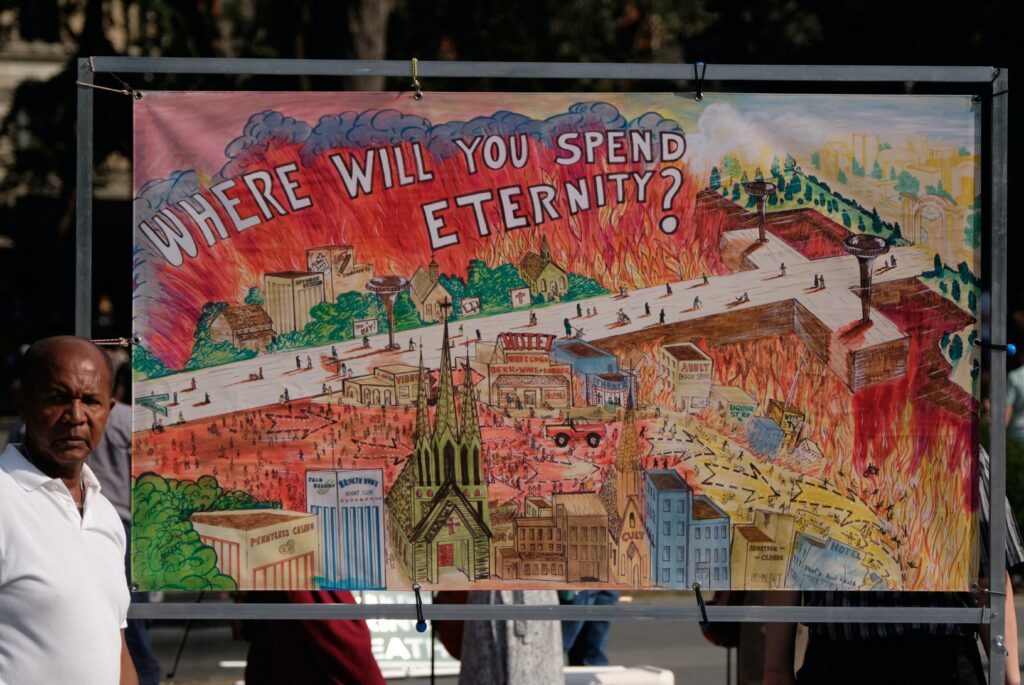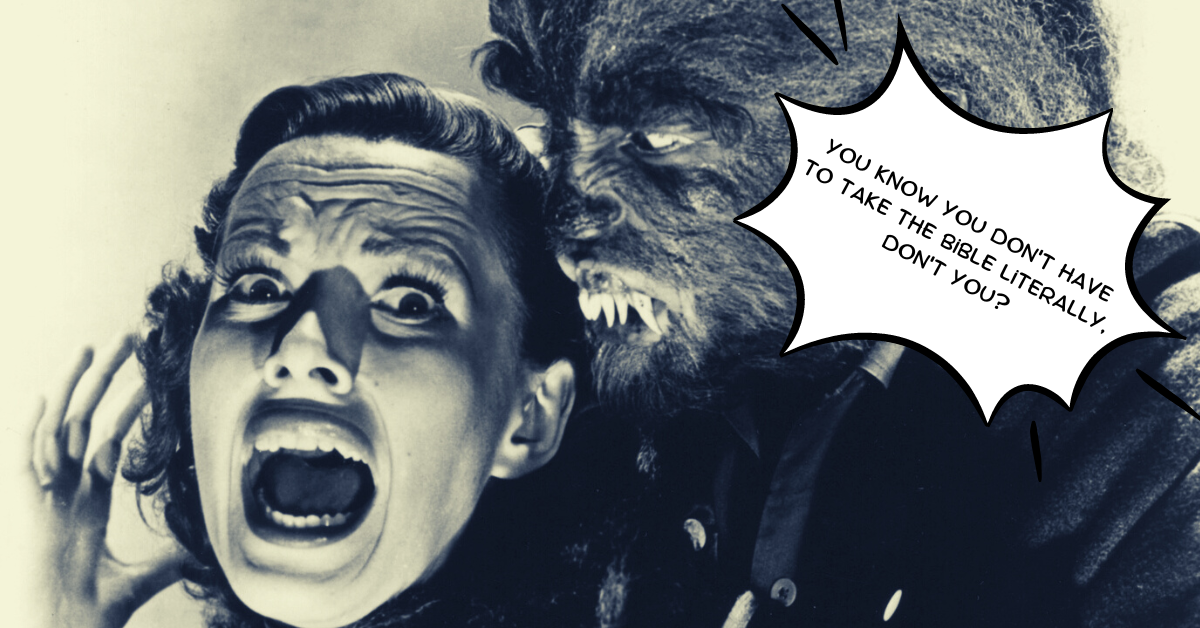It was the summer of 2005, and to my horror, I had discovered that a fellow first-year counselor at the United Methodist summer camp in Fruitland Park, FL, harbored what seemed to be inerrantist sympathies. What horrified me was not that someone associated with my denomination would accept something like biblical literalism–you quickly realize growing up in Central Florida that many, perhaps most, Methodists were crypto-Southern Baptists to some degree. What horrified me was that this particular counselor, a student at an Ivy League university, someone so cool, cultured, and smart, someone whose approval and respect I desperately wanted, would have such unsophisticated beliefs. Assuring myself that an information gap offered the only realistic explanation of the problem, I figured the quickest solution was to simply educate my friend.
So I bought him a book.
I don’t actually remember the specific name of the book I ordered: I’d been reading both Taking the Bible Seriously by J. Benton White and Reading the Bible Again for the First Time by Marcus Borg around that time, so it was one of those. What I do remember clearly, though, was determinedly cornering my friend as he was going into his cabin, proudly handing him my hoped-for silver bullet to his ignorance, and smugly saying something like “this’ll show you why you don’t have to take the Bible literally.”
Significant self-awareness remained mostly beyond the capacity of my just-graduated self, so it would sadly be several years before I could fully appreciate the irony of the circumstances I found myself in that day. At the point in my life when I was most likely to look at evangelism with derision and dismissal, I was shoving an extended tract for my kind of Christianity into one of my new friend’s hands.
In many ways, my inability to remember the exact title of the book I gave my friend is emblematic of the kind of progressive Christianity I’d adopted by the end of high school—a version that had less to do with a well-thought-out positive set of beliefs than the formation of an identity opposed to the Christianity serving as the backdrop to my growing up. To be clear, I didn’t pick up this zealous, evangelistic liberalism from my seminary-educated parents. What sticks out about my home formation are things like learning bible stories and the cultural context that lay behind them, being encouraged to engage my faith with intellectual capacities, seeing my mom set aside daily devotion time, going to church even when it wasn’t convenient, and an ethical outlook based on responding graciously to God’s saving work in our lives.
—————————–

My own adoption of an aggressively progressive (or at least anti-conservative) Christianity emerged in response to the dominant Christianity outside my home. In 1990s and early 2000s Central Florida, I felt bombarded by a much stricter and more aggressive form of Christianity: belief in an inerrant, contradiction-free Bible, the incompatibility of Christianity and evolution, the equation of doubt and sin, firm commitment to eternal conscious torment for everyone who hadn’t explicitly accepted Jesus as their personal Lord and Savior, and a certainty that being Christian meant voting Republican. These messages seemed to come from everywhere but home: from whispered conversations with classmates in seventh-grade social studies about Hell awaiting non-Christians, from youth group leaders showing videos about the demonic character of Halloween, from early mornings at See You at the Pole and the Fellowship of Christian Athletes, from every illustration at every talk at every beach retreat, service project, and mission trip undertaken with the other churches in town.
After years of frustration with this other form of Christianity, I initially decided to rebel by becoming an atheist, or at least agnostic. This proved an unsustainable new religious identity—as much as agnosticism really did fit my persistent doubts about the existence of God, doubts that started to intrude on the regular course of my mental life in high school, I found I had been habituated too well by my family and my Churches. Try as I might, I couldn’t stop seeing myself as Christian. So, if I couldn’t shake my Christian identity, I resolved to take on a Christian identity that was antithetical to everything restrictive, dogmatic, and, above all, conservative.
I’d love to say that a deep conviction about something like the harms of purity culture or prejudice against non-Christians motivated my rejection, but if I’m really honest it’s because I had come to see myself as a Very Smart Person and I couldn’t see conservative Christianity as anything but boorish and anti-intellectual. This brings me back to my point about not having had a specifically systematic or well-thought out progressive Christian worldview. Mine was ad hoc, built on pride in my own intellect and cultural sensibilities and almost certainly full of all manner of contradictions.
This identity as a partisan of aggressively progressive Christian thought proved short-lived and fragile. It started cracking in a way I was aware of just a few months—it may even have been weeks—after my summer camp experiment in proselytizing. A freshman religion major at Florida Southern College, I was taking the introduction to theology course, and the professor was introducing us, affirmingly, to this guy named Karl Barth. Somewhat distressingly the professor was talking about the centrality of the Bible for Barth’s thought, and this seemed to be courting biblicism in my mind. More worryingly though, Barth, and by extension the professor, seemed to talk glowingly about Anselm of Canterbury. I had just finished a book laying some aspect of the Western tradition’s belief in Hell at Anselm’s feet, and so I could be assured he was on the Wrong Side.
Cornering my professor in the stairwell of Edge Hall after class one day, I asked some version of, “This Karl Barth guy seems pretty conservative from what you’ve taught. Am I just going to have to hear that being a Christian means being a conservative again?”
“Chris, Karl Barth was a socialist,” my professor replied.

This response preceded what I assume was a nuanced description of the importance of Anselm’s place in the Western tradition, as well as the strengths and weaknesses of his thought (I’d also brought up my newly adopted theories on Anselm’s alleged villainy), but I can’t say I really remember those. Until that conversation I had assumed that to be traditional or orthodox in one’s beliefs required one to adopt reactionary social and political views, and vice versa. The revelation that one could hold traditional Christian beliefs and be not just politically progressive, but a socialist, exploded my preconceived categories and opened whole possibilities for me. As time went on, I came to appreciate that not only was there no essential link between traditional Christian beliefs and conservative politics, but that orthodox beliefs could even motivate so-called “progressive” political and social stances.
—————————–
My movement out of that aggressively progressive Christianity was not, of course, accomplished in a single conversation. It would be several years before I gained a greater openness toward the notion of personal spiritual forces like angels and demons (for some reason I had internalized this notion that sophisticated modern Christians must be careful not to posit a spiritual realm populated with any beings other than God). It would be yet another few years before I realized that the distinction I maintained between the plausibility of the Resurrection and the plausibility of the Virgin Birth was artificial and yet another lingering effect of my anti-supernaturalist prejudices. And I’m sure that as I continue to develop in my faith, and reflect on that faith, I’ll have to continue interrogating the impulse to reject certain beliefs that (due to lingering prejudices I have) seem “too conservative.”
Along this journey, I have found a freedom in rejecting the easy either/or thinking that wants to make “progressive” and “conservative” distinct theological camps. In a certain way, it’s right to say that this means I’ve become more conservative or traditional in my belief, seeing that I do now subscribe to, or at least appreciate several views that would have horrified my eighteen-year-old self, such as my own idiosyncratic kind of scriptural infallibilism (but not inerrancy!) or substitutionary atonement. More importantly, I am much more comfortable now than I ever was before saying Christianity’s real goal is growing in relationship with God through Jesus.
Certainly, growing in relationship with God means knowing things about who God is, and this means conversations about correct and incorrect beliefs. But like an escalator that you no longer have need of after reaching the top, such beliefs may facilitate our journey toward greater relationship with God but are not the relationship itself. As beliefs have become a means of ascent to God, the God who grounds and imparts my value, rather than a way of constructing my value, I’d like to believe I have more room to see authentic relationships with Jesus facilitated by beliefs across the theological spectrum. The more I grow in my faith, the more I can live with the tension between the dual truths that what we believe matters AND that it is only God (not what we believe, whether progressive or conservative, orthodox or heterodox) who saves us.




This is great Chris. Thank you so much for sharing. I had a similar experience of going from fundamentalist to reactionary liberal to (hopefully!) generously orthodox. Fantastic food for thought.